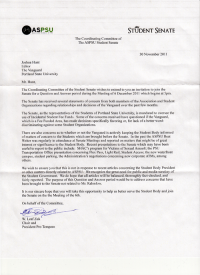On Jan. 15, the Student Fee Committee held deliberations for the 2012-13 student publications’ budget proposals in a meeting attended by Dean of Student Life Michele Toppe. The SFC proposed the reclassification of student positions at Portland State publications, which includes the Vanguard, the Rearguard, Portland Spectator, KPSU, PSU–TV, Pathos and The Portland Review.
SFC to change pay structure for student publications
On Jan. 15, the Student Fee Committee held deliberations for the 2012-13 student publications’ budget proposals in a meeting attended by Dean of Student Life Michele Toppe. The SFC proposed the reclassification of student positions at Portland State publications, which includes the Vanguard, the Rearguard, Portland Spectator, KPSU, PSU–TV, Pathos and The Portland Review.
Currently, all students working at university publications are compensated using an hourly wage model; employees are paid a set wage for the number of hours they work. The number of hours a student can dedicate to working are limited by the Human Resources Department at PSU. For instance, no student employee may log more than 40 hours in one work week, or more than 130 hours in a month.

The SFC meeting addressed concern over legal issues that may arise if students work beyond the set hour limitation and are not paid for doing so. Compensating students for the number of hours they actually work would increase the amount of money the university needs to allocate from student fees to the various publications.
In regards to the Vanguard—the publication with the highest budget and largest staff—SFC committee member Sean Green said, “The path we are going down is that paying Vanguard employees by the hour will increase the burden on the student fee.”
The SFC proposed that higher-level publication positions—such as editors-in-chief, associate editors and production managers—would no longer receive an hourly wage, but instead a “student leadership award.” Lower-level employees, like writers and photographers, would not be taken off the hourly wage model by the SFC.
The student leadership award, dispensed to students in a lump sum at the end of the term, would only be issued to those student employees in positions of authority and management, for the time being. However, Green expressed his belief that even publication writers could be reclassified at some point in the future.

The amount of money student editors and managers would receive under the student leadership award plan varies little from the compensation they receive under the hourly wage model; however, the new model would significantly alter student employees’ labor law protections.
Moving away from the hourly wage model means student publication employees would no longer be paid through PSU’s payroll system. Instead, compensation would be awarded through the financial aid structure, much like a scholarship.
According to the State of Oregon Department of Human Services, individuals not logging hourly wages are not eligible to apply for food stamps. Additionally, because pay would be awarded in a manner similar to a scholarship and not through payroll, publication employees would no longer be protected by state and federal labor laws.
Student employee income would not be subject to the State of Oregon minimum wage standard nor would it be taxed; this means that PSU does not have to pay into unemployment insurance and students will not be eligible to apply for unemployment benefits should they lose their job.
The SFC’s new payment structure is made up of five tiers, which were created during the meeting, which lasted more than five hours. Student publication employees are designated to a specific payment tier by the SFC based upon the perceived amount of responsibility and share of the workload the student has at the publication. SFC members could not agree on precisely what criteria are used to determine which employees should be paid an hourly wage and which should receive student leadership awards.
Food For Thought cafe was mentioned as a possible candidate where some employees might also be reclassified in the future.
Dean of Student Life Michele Toppe said that altering the payment structure “is about incentivizing efficiency.”
Tier five represents the highest paid publication employees with the most responsibilities—employees such as the editor-in-chief of the Vanguard and the KPSU station manager. The SFC proposed a student leadership payment of $11,000 a year to these students.
Tier four would apply to Vanguard section editors, who would receive a pay rate of $9,000 per year, a decrease of more than $1,000 from the previous budget. Positions of slightly less responsibility would be placed in tiers three, two or one according to the students’ duties to the publication, and compensation decreases by $1,500 per tier.
The SFC will present their findings to PSU’s Publications Board for recommendation. Beginning Jan. 23, the SFC will hear all budget appeals including those for university publications.







Correction: Mart Stewart-Smith did not run on Adam Rahmlow’s slate.
This is probably headed very much in the wrong direction, and I may testify. Michelle Toppe’s comment that some student workers need to have their efficiency “incentivized” is as wildly insulting as it is inaccurate.
Theo Burke
former Vanguard writer
Isn’t this basically the model the student publications worked on prior to the 2010 restructuring?? It made sense then, editors were able to make a fair wage that prevented them from having to work multiple jobs, and writers and photographers were paid by article/photo submission. The hourly wage for editors has reduced the publishing days and the quality of the Vanguard substantially. Good move Mart!
Lindsay, no this is not how pay worked before restructuring. While editors were paid a flat rate, that was dictated by minimum wage and an estimated hours worked. Secondly, while the VG has decreased publishing DAYS, their content has not decreased, as each issue has almost twice as much content. As far as the quality of that content, I ask you to pull out an issue from any publication on campus (especially the Vanguard) and compare it to that of two years ago, though you are of course, entitled to your own opinion.
I can’t even begin to describe how opposed I am to this change… what can we do to fight this???